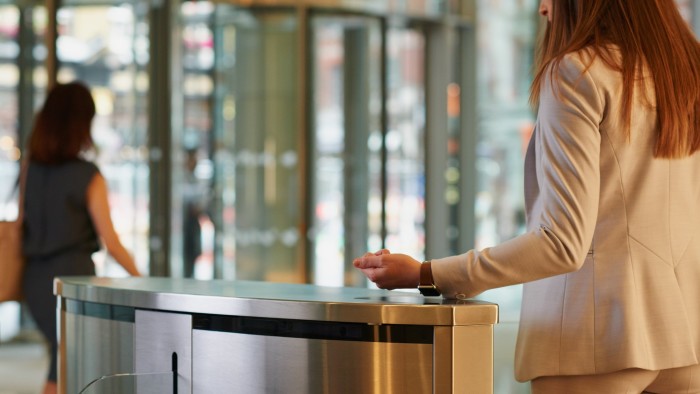The perils and promise of appraisal by smartphone

Roula Khalaf, Editor of the FT, selects her favourite stories in this weekly newsletter.

A colleague of mine once covered a summit alongside an ambitious younger reporter sent from another office. Afterwards, the older journalist called me, astonished that the visiting correspondent had spent every hour in the fug-filled press room waiting for briefings instead of using the downtime to visit some nearby baroque churches, as he had.
I am certain each gave their best to the assignment, one energised by the adrenaline rush of covering every twist of the meeting, the other inspired by his architectural side-trip. In the workplace of the near future, though, their managers might also have assessed performance by the number of steps they had taken that day, their heart-rate, sleep and stress levels, and time they had spent on their devices during the summit.
A study by researchers from a number of US universities brings a step closer this sometimes unsettling vision of a workforce assessed by knitting together personal and professional data. By monitoring such information remotely, the research team was able to distinguish between high and low performers. Co-author Andrew Campbell, computer science professor at Dartmouth College, New Hampshire, says it will take at least five years for this sort of system to roll out to employers, but “in 10 years, it’s going to be in our lives”.
The study has a well-meaning goal. For all the tinkering with dreaded employee appraisal systems, ways of assessing how we work are still worryingly subjective. Prof Campbell spent a year seconded to Google and was amazed to find its performance management was still “olde worlde”, based more on written feedback than data. He and colleagues believe an appraisal that at least incorporates some passive monitoring — collected, in the experiment, via locator beacons, apps and fitness bands — could offset human biases.
This human resources grail is the object of a wider quest. The latest study is supported by the Intelligence Advanced Research Projects Activity run by the US Office of the Director of National Intelligence. Iarpa’s Mosaic programme uses “multimodal sensing to measure personnel and their environment unobtrusively, passively, and persistently” across their career. Coming soon from John le Carré: The Spy Who Came in from the Cold Because His Robot Handlers Realised His Heart Was Racing and He Was Sleeping Poorly.
For many workers, though, passive and persistent monitoring is a case for complaint to an employment tribunal rather than a cause for celebration.
One risk is that as soon as a new measure is used to assess performance, the subjects will game it. As insurers have started rewarding the number of steps their customers take, gadgets to pad out performance have proliferated. Step-count increasers — including a sort of rocking phone cradle — are said to be among the most popular items on China’s Taobao ecommerce site.
Virtual management, however unobtrusive, could encourage virtual presenteeism, as staff “clock in” repeatedly, with beacons tracking their location, and focus on input not outcomes. Managers may be tempted to press for productivity-improving behaviour, to the detriment of staff wellbeing, in an app-based version of the “scientific management” of efficiency-obsessed time-and-motion pioneer Frederick Winslow Taylor. This trend has been under way ever since the first warehouse employee was issued with a pedometer or wristband.
Still, amid concerns about confidentiality, privacy and snooper managers, there is promise.
Dartmouth ran a separate study with students who volunteered to have their sleep, mood and even partying trends compared with academic performance. In future, the college could provide feedback, nudging students to go to bed earlier when they need energy for exams, or picking up warning signals about poor mental health.
Some of the workplace study’s conclusions are predictable. The more conscientious participants performed better. Lower phone use correlates with improved results. Less obviously, better performing supervisors visited fewer places, perhaps showing it was harder to divert them from priorities.
The insights from such passive data-gathering are bound to be job-specific. A programmer spends more time at her screen than her manager; a consultancy partner works differently from a tech team leader. Where one colleague flourishes on press-room buzz, another may need a dose of baroque to turn in his best work.
Some people — I am one of them — may be intrigued by the opportunity to improve their own performance with insights from their personal data; others may be appalled. That is the key lesson. Whether the potential of such data-gathering is realised tomorrow or in 10 years, it must be up to individual employees to decide how, and even whether, they choose to use them.
Twitter: @andrewtghill
Comments